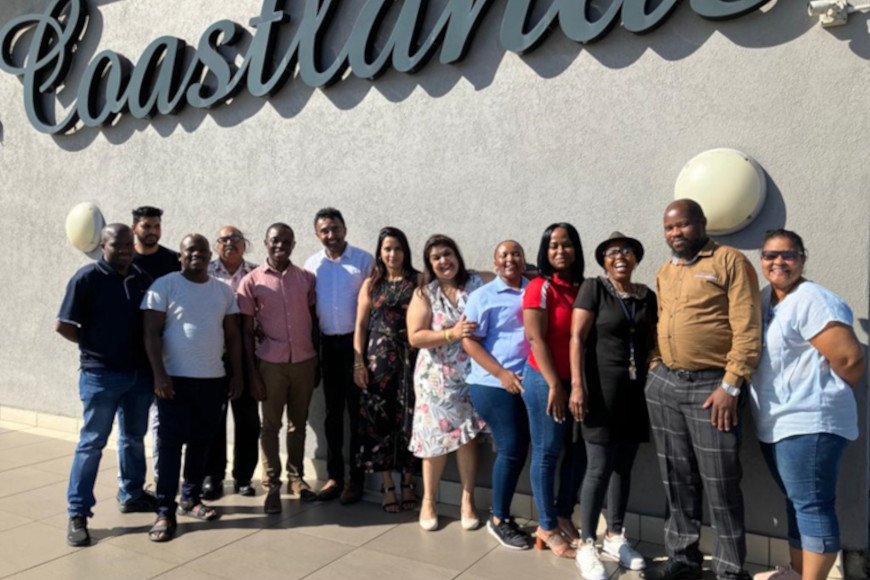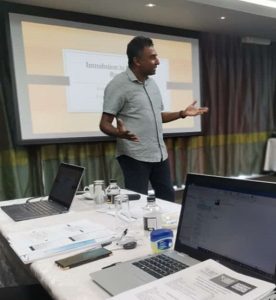The Department of Financial Accounting organised a research workshop for the Accounting Cluster from the Faculty of Accounting and Informatics (FAI) from 29 to 30 November 2022 at the Coastlands Hotel in Musgrave, Durban.
The main objective of the accounting research workshop was to equip staff with the skills and knowledge necessary to incorporate qualitative research into the research space at the Durban University of Technology (DUT) accounting research to produce socially relevant research via triangulation.
A robust objective of the workshop was to fill in such a gap. The two-day workshop hosted twenty (20) academics, researchers, scholars and emerging scholars from the Departments of Financial Accounting, Auditing and Taxation and Management Accounting. Insights and wisdom on why and how qualitative research could be conducted were shared with the participants by Professor Kelum Jayasinghe from the University of Essex, UK-Essex Business School (EBS).
The overarching purpose of Day one was to broaden the qualitative research skills and to widen the purview of DUT accounting researchers to address the gap in their research lifecycle. To achieve this, Professor Kelum Jayasinghe holistically imparted skills and knowledge to them by covering the following key components: (1) What is qualitative research all about? (2) qualitative research techniques, qualitative characteristics of qualitative research, its methodological positions and methods (3) high-level basic steps of qualitative data analysis were spelt out.
Qualitative data presentation, theories in data analysis, and rigor in qualitative research approach was also emphasised. This was followed by reflectivity in qualitative research and useful tips to increase the credibility of research results. The final presentation of the first day covered recaps and consistent reflections on the presentation of day one and sharing experiences among participants.
Prof. Kelum opened the second day with an interesting topic about how to publish accounting papers in top-tier journals. Prof Kelum emphasized the need for academics to aspire to publish in high-impact journals because such achievements will provide researchers recognition among their peers, locally and internationally. A number of interesting issues were discussed on this particular topic.
Prof. Kelum highlighted that for a paper to be accepted in a top-tier journal, it must possess the following characteristics: it must begood and interesting research, it should be on-topic and appropriate to the venue (target journal and audience), it must be well-written, and should be of the particular type and flavour that the venue reviewers will be interested in and welcome, with contributions to the field that are clearly argued.
Prof Kelum admonished the participants not to shy away from presenting their works to their colleagues in departmental or faculty seminars. He stressed that such engagements could provide valuable feedback and suggestions from peers. Another admonition from the professor was that staff members should endeavour to attend and present at conferences organised outside Durban and South Africa, which all participants agreed and committed to attend.
An important piece of advice offered by Prof Kelum was the need to read the requirement and author guidelines of the journals chosen for the research papers. Most at times, papers get rejected on the basis of not following the prescribed guidelines, hence Prof Kelum’s emphasis.
The enthusiasm, engagement and participation of the staff were a testament to the importance of this topic. Staff members were happy and thrilled by Prof Kelum’s level of knowledge on qualitative research study. One unique thing about Prof Kelum, which all participants highlighted, was his humility and willingness to listen to views and positions different from those he postulated.
The second day and the workshop ended with the identification of various research projects for the accounting cluster. With the guidance of Prof Kelum, the group identified four main research projects. These research projects comprised farming, which was the biggest project among those identified. Three additional projects involving Decolonization of Accounting Education, Professionalism of the Audit Practice and Community Engagement Initiatives were also identified. Members voluntarily asked to be included in one or more projects.
The three HODs present, Dr Marimuthu, Dr Jali and Professor Swanepoel promised to organize more workshops and writing retreats to improve the research capacities of the staff to pursue the various projects effectively.
Dr Haruna Maama, Dr Asogan Moodley and Dr Jean Mvunabandi were selected to lead the Decolonization of Accounting Education, Professionalism of the Audit Practice and Community Engagement Initiatives projects, respectively. The farming project will be decoupled and will have various leaders. The participants thanked Prof Kelum for sharing his knowledge and wisdom with them. Special thanks to Adele Robinson for organisaing the workshop on short notice.
Pictured: DUT Faculty of Accounting and Informatics, Accounting Cluster staff, with Professor Jayasinghe
Siphokazi Dlamini/Dr Haruna Maama/Dr Jean Mvunabandi


